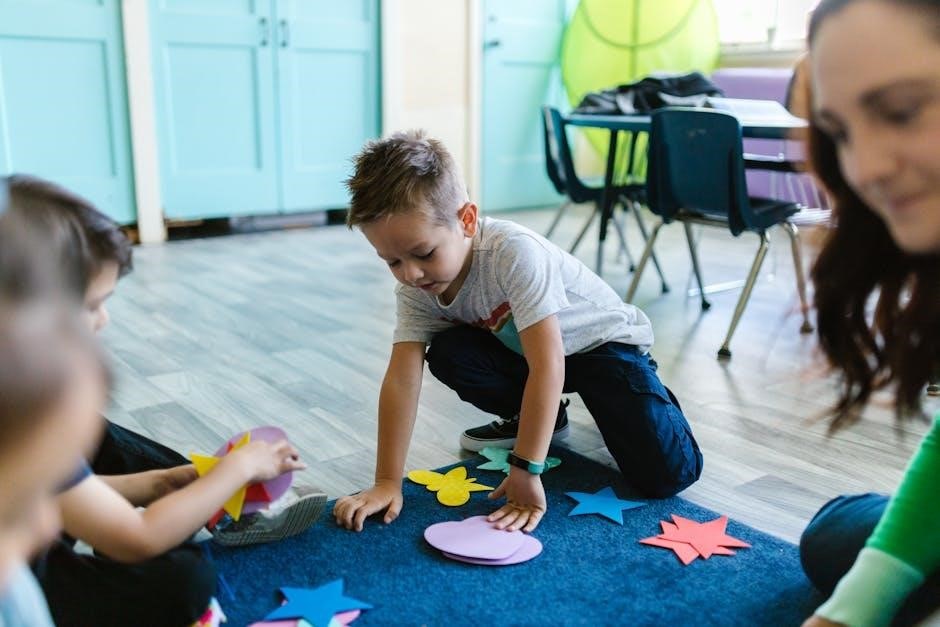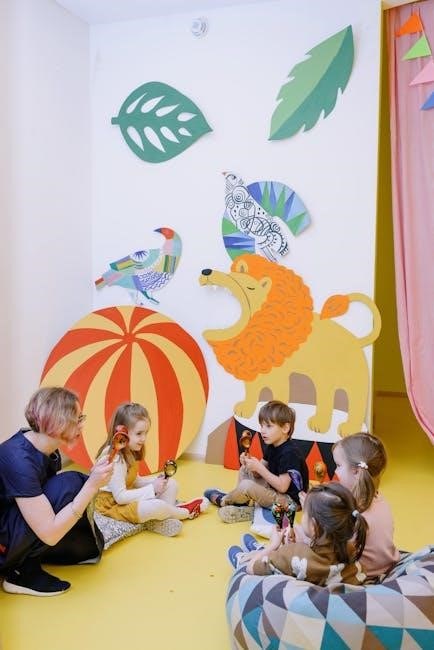Role play engages students in real-life scenarios‚ fostering interactive language practice. It enhances speaking‚ cultural understanding‚ and emotional intelligence‚ making learning dynamic and enjoyable while bridging theory and practical application effectively.
Importance of Role Play for English Language Learners
Role play is a powerful tool for English language learners‚ offering immersive‚ interactive experiences that simulate real-life situations. It helps learners apply language skills practically‚ fostering confidence and fluency in communication. By engaging in role plays‚ students develop problem-solving abilities‚ critical thinking‚ and teamwork. This method also enhances emotional intelligence‚ allowing learners to understand and express emotions effectively. Role play encourages active participation‚ reducing language learning anxieties and creating a supportive environment for practice. It bridges the gap between theoretical knowledge and practical application‚ making language acquisition more meaningful and enjoyable. Learners gain exposure to diverse contexts‚ from everyday interactions to professional scenarios‚ preparing them for real-world communication. Regular role play activities also promote cultural awareness‚ helping students navigate diverse social and professional settings with ease. Ultimately‚ role play is a dynamic and effective strategy that enriches the language learning process‚ making it engaging and impactful for students of all levels.
Benefits of Role Play in Developing Speaking Skills
Role play significantly enhances speaking skills by immersing learners in realistic conversations. It encourages spontaneous dialogue‚ allowing students to practice pronunciation‚ intonation‚ and vocabulary in context. Through role play‚ learners gain confidence in expressing themselves‚ reducing hesitation and improving fluency. Interactive scenarios simulate real-life challenges‚ helping students think critically and respond appropriately. This active engagement fosters creativity and the ability to adapt to unpredictable situations. Role play also provides opportunities for feedback‚ enabling learners to refine their communication strategies. By participating in diverse roles‚ students develop a deeper understanding of language nuances and cultural differences. Regular role play activities create a supportive environment where mistakes are viewed as learning opportunities. Ultimately‚ role play equips learners with the practical skills needed for effective communication‚ making it an invaluable tool for developing speaking proficiency in English.

Popular Role Play Topics for Students

Popular role play topics include everyday situations like ordering food‚ shopping‚ and making reservations. Social interactions like inviting friends or attending parties are also common. Professional scenarios‚ such as job interviews‚ are frequently used‚ providing practical and relevant practice for real-life English conversations.
Everyday Situations: Ordering Food‚ Shopping‚ and Making Reservations

Everyday situations like ordering food‚ shopping‚ and making reservations are essential role-play topics for English learners. These scenarios simulate real-life interactions‚ helping students practice vocabulary and phrases related to common tasks. For example‚ ordering food in a restaurant allows learners to practice asking for menus‚ understanding prices‚ and making decisions. Shopping role-plays teach students how to bargain‚ describe preferences‚ and interact with salespeople. Making reservations‚ whether for hotels‚ restaurants‚ or events‚ helps students master formal communication and time management. These activities are practical and relatable‚ making language learning interactive and enjoyable. By engaging in these role-plays‚ students build confidence in using English for everyday needs‚ preparing them for real-life encounters. This approach also encourages creativity and teamwork‚ as students collaborate to navigate hypothetical situations. Overall‚ these topics provide a solid foundation for developing practical communication skills in English.

Social Interactions: Inviting Friends‚ Attending Parties‚ and Celebrating Events
Role-playing social interactions like inviting friends‚ attending parties‚ and celebrating events helps English learners practice communication in casual and festive settings. These scenarios teach students how to extend invitations‚ respond politely‚ and engage in small talk. For example‚ inviting a friend to a party allows learners to practice phrases like “Would you like to join us?” or “What time should I pick you up?” Attending parties or celebrations involves practicing greetings‚ compliments‚ and conversation starters. These activities also introduce cultural nuances‚ such as birthday traditions or holiday greetings‚ enhancing students’ cultural awareness. By simulating these interactions‚ learners build confidence in using English for social purposes. Role-plays like these encourage teamwork‚ creativity‚ and problem-solving‚ making language learning enjoyable and relevant. They also help students navigate common social situations with ease‚ preparing them for real-life interactions in English-speaking environments.

Professional Scenarios: Job Interviews‚ Workplace Communication‚ and Problem Solving
Role-playing professional scenarios like job interviews‚ workplace communication‚ and problem-solving is essential for English learners aiming to excel in professional environments. These activities simulate real-world workplace interactions‚ helping students develop critical skills such as articulating ideas clearly‚ negotiating‚ and resolving conflicts. Job interviews‚ for instance‚ allow learners to practice answering common questions‚ showcasing their qualifications‚ and demonstrating confidence. Workplace communication scenarios teach students how to collaborate with colleagues‚ delegate tasks‚ and address challenges effectively. Problem-solving role-plays encourage learners to think critically and propose solutions in a team setting. By engaging in these activities‚ students gain a deeper understanding of professional etiquette and cultural expectations in English-speaking work environments. Role-plays also help learners build confidence in using English for formal and informal workplace interactions‚ preparing them for the demands of a globalized job market. These scenarios are particularly effective for upper-level students looking to refine their language skills for career advancement.

Advanced Role Play Ideas for Upper-Level Students
Advanced role plays focus on complex conversations‚ debates‚ and cultural scenarios‚ enhancing deep critical thinking and emotional intelligence. These activities challenge students to navigate nuanced interactions‚ fostering advanced communication skills and cultural adaptability.
Complex Conversations: Negotiations‚ Debates‚ and Conflict Resolution
Engaging in complex conversations through role play allows upper-level students to refine their verbal and non-verbal communication skills. Activities like negotiations and debates encourage critical thinking‚ persuasive techniques‚ and active listening. Conflict resolution scenarios‚ such as mediating disputes or resolving workplace issues‚ help students develop empathy and problem-solving abilities. These exercises mirror real-life situations‚ preparing learners for professional and social challenges. By simulating debates on global topics or ethical dilemmas‚ students enhance their ability to articulate opinions and respond thoughtfully to opposing views. Role plays also foster collaboration‚ as students often work in teams to reach mutually beneficial solutions. This approach not only strengthens language proficiency but also builds confidence in handling high-stakes interactions‚ making it an invaluable tool for advanced English learners.
Cultural and Emotional Intelligence: Understanding Different Perspectives and Emotions in Communication
Role play activities focused on cultural and emotional intelligence help students navigate diverse perspectives and emotions in communication. By simulating interactions with people from different cultural backgrounds‚ learners gain insights into customs‚ values‚ and social norms. These exercises encourage empathy and understanding‚ essential for bridging cultural gaps. Students also practice recognizing and managing emotions‚ such as empathy‚ patience‚ and respect‚ which are critical in cross-cultural communication. For instance‚ role plays involving misunderstandings or cultural conflicts allow students to develop strategies for resolving issues respectfully. Additionally‚ scenarios that explore emotional responses‚ like expressing gratitude or consolation‚ help learners refine their ability to communicate sensitively. These activities not only enhance language skills but also foster a deeper appreciation for cultural diversity and emotional awareness‚ preparing students for global interactions and fostering inclusive communication.
Role play is a powerful tool in English learning‚ fostering communication skills‚ cultural understanding‚ and emotional intelligence. It prepares students for real-life interactions‚ making language acquisition engaging and effective for diverse learners.
How to Implement Role Play Effectively in the Classroom
Implementing role play effectively begins with setting clear objectives and choosing relevant scenarios. Teachers should provide context through stories‚ images‚ or discussion questions to engage students. Assigning roles and offering prompts ensures clarity. Encouraging preparation time allows students to feel confident. During the activity‚ circulating to offer support and feedback is crucial. Afterward‚ facilitating group discussions to reflect on the experience enhances learning. Involving the entire class in providing constructive feedback fosters a collaborative environment. For larger classes‚ using facilitators to guide the role play can maintain engagement. Ensuring a variety of topics‚ such as ordering food or job interviews‚ keeps activities fresh and relevant. By making role play interactive and meaningful‚ educators can maximize its benefits for English language learners‚ helping them build both language skills and cultural understanding in a dynamic and enjoyable way.